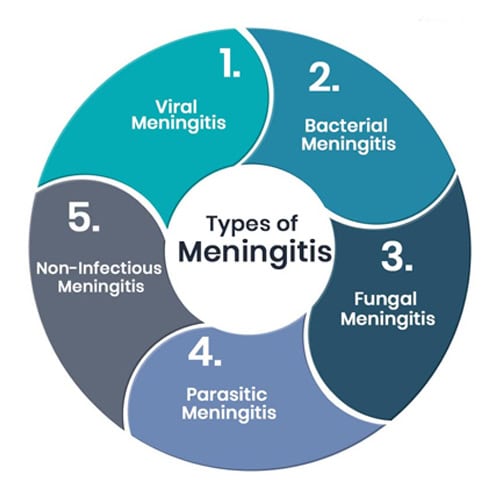Encephalitis & Meningitis treatment in Ludhiana, Punjab
What is meningitis?
Encephalitis & Meningitis treatment in Ludhiana, Punjab, Meningitis is a health condition that leads to meninges inflammation. In total, they are 3 membranes covering your spinal cord and brain. Meningitis is triggered when fluid surrounding that area is infected. It mostly occurs due to bacterial and viral infections. Some of the additional causes are:
- Chemical Irritation
- Fungi
- Drug allergy
- Cancer
Some of the infections can spread from one person to another through close contact, coughing, and sneezing.

What are the most common symptoms of meningitis?
Initially, the patient can have the same symptoms with bacterial and viral infections. Although, their extent might get severe with time. Depending on your age, symptoms will be different for every person.
Viral meningitis symptoms
- Symptoms in infants
- Sleepiness
- Irritability
- Reduced food cravings
- Feeling lethargic
- Fever
- Symptoms in Adults
- Stiff neck
- Headache
- Fever
- Seizures
- Bright light sensitivity
- Decreased appetite
- Feeling lazy and no zeal to do any type of work
- Vomiting and nausea
Bacterial meningitis symptoms Bacterial meningitis develop overnight and you will notice:
- Altered mental status
- Fever
- Chills
- Stiff neck
- Sleepiness
- Nausea
- Vomiting
- Sensitivity to light
- Irritability
- Headache
- Lethargy
- Purple areas of skin that resemble bruises
Fungal meningitis symptoms They might look like same as another type of infection and you will notice:
- Nausea
- Vomiting
- Fever
- Headache
- Sensitivity to light
- Confusion or disorientation
What are the types of meningitis?
As we have mentioned above, viral and bacterial infections are common reasons behind it. Let’s shed light on the types of meningitis.
-
- Viral Meningitis: One of the most common types and its prevalence is in around 85% of the patients. Common during fall and summer and it includes:
- coxsackievirus A
- coxsackievirus B
- echoviruses
- Viral Meningitis: One of the most common types and its prevalence is in around 85% of the patients. Common during fall and summer and it includes:
Some of the causes can be treated without the need for treatment. Although, some of them do not need the treatment.
- Bacterial meningitis: It is caused by different bacteria and it is contagious, therefore it is important to get the treatment. Around 5% to 40% face this problem. Its most common types are:
- Streptococcus pneumoniae (in the respiratory tract, sinuses, and nasal cavity)
- Neisseria meningitidis (spread through saliva and other respiratory fluids)
- Haemophilus influenzae (infection of the blood, inflammation of the windpipe, infectious arthritis)
- Listeria monocytogenes (which are foodborne bacteria)
- Staphylococcus aureus (found on the skin and in the respiratory tract)
- Fungal meningitis: One of the rare types, which infects the body, spreads in the body through blood flow and reaches the spinal cord and brain. If you have a weak immune system, then your chances to develop this condition will increase.
- Parasitic meningitis: Not that common as bacterial and viral meningitis but they occur due to parasites found in the feces, dirt, and on the animals & food. This type is not contagious.
- Non-infectious meningitis: Although these are not categorized as infections they happen due to a medical problem which includes cancer, medications, head injury, lupus, and brain surgery.

What are the causes of meningitis?
Who should be vaccinated against meningococcal meningitis?
The people who are at high risk need to get the vaccination and it includes:
- College freshmen who live in dorms and haven’t been vaccinated
- Adolescents who are between 11 to 12 years old
- People traveling to countries where meningococcal disease prevalence is extremely high.
- Children ages 2 or older who don’t have a spleen or who have a compromised immune system

